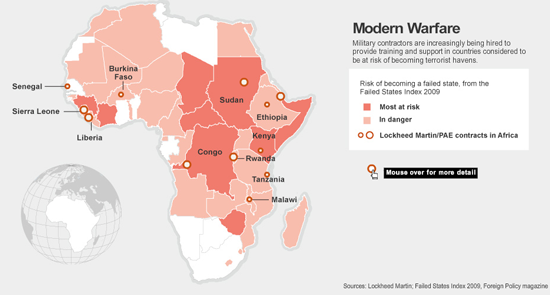The “smart power” military-industrial complex takes off
What do Lockheed Martin Corp, Northrop Grumman Corp, and L-3 Communications Inc. have in common? Yes, all are top 10 Pentagon contractors. But they are also increasingly winning lucrative government contracts to implement “smart power” or “nation-building” programs—like educating peacekeeping troops in human-rights law, sending anthropologists to Afghanistan to understand local culture, mentoring Liberian prosecutors to combat corruption and crime, and rebuilding airports and government ministries.
Hillary Clinton and others in the administration have helped pave the way for this shift by calling for a “smart power” approach in which the 3Ds—defense, diplomacy and development—are mutually reinforcing (which we respectfully acknowledged by giving the 3Ds idea our Grand Prize for Worst in Aid).
From yesterday’s Wall Street Journal (subscription required):
Defense firms are eager to oblige. "The definition of global security is changing," says Lockheed's Chairman and Chief Executive Robert Stevens. He wants the maker of the Air Force's most advanced fighters to become a central player in the U.S. campaign to use economic and political means to align countries with American strategic interests
Last year, Lockheed had two of its highest profile programs, the F-22 Raptor fighter and a fleet of presidential helicopters, ended by the Obama administration. Now, Lockheed is one of several defense firms expected to bid for a new State Department contract to support "criminal justice sector development programs world-wide," that could be worth up to $30 billion over five years.
Africa won’t be overlooked:
Africa—where few U.S. troops are stationed—is a major focus. Many countries on this continent already are, or risk becoming, failed states. While they previously hadn't been considered a threat to the U.S., that view is changing. Somalia's nexus of terrorism and piracy is one example of how destabilized countries can become a redoubt for al Qaeda or other terrorist groups.
The U.S. military is already overstretched between Iraq and Afghanistan. So the Pentagon is eager to send defense firms to fill the gaps, in the hope that investing millions in training or advisory programs today may stave off a regional calamity that could cost billions in the future.
"Africa certainly is an area of interest to our U.S. government customers, and what's important to our customers is important to us," said Lockheed's Mr. Stevens.
UPDATE: Vijaya Ramachandran reminded us on Twitter that she had a related post "Blurring the Line Between Defense and Development" on the CGD Blog:
In a little-noticed move in January, private military contractor DynCorp bought 100% of the shares of international development contractor Casals & Associates ....The .. merger suggests a blurring of the line between development and defense in the private sector, as well.
...what happens when unarmed development project managers and heavily armed private security providers work under the same company brand? How will local people respond to a company employed by both USAID and the U.S. military?
On the other hand, there are some clear advantages to the new approach....
 From Aid to Equality
From Aid to Equality

